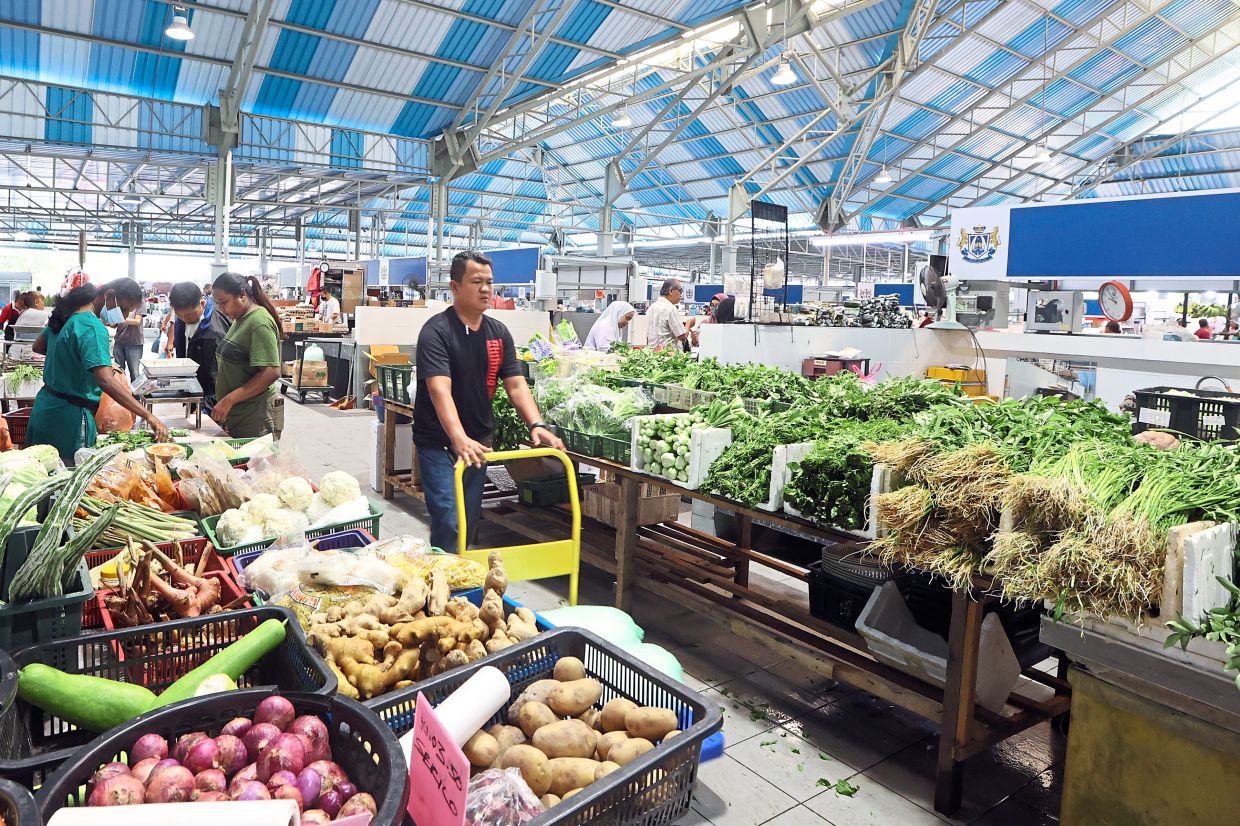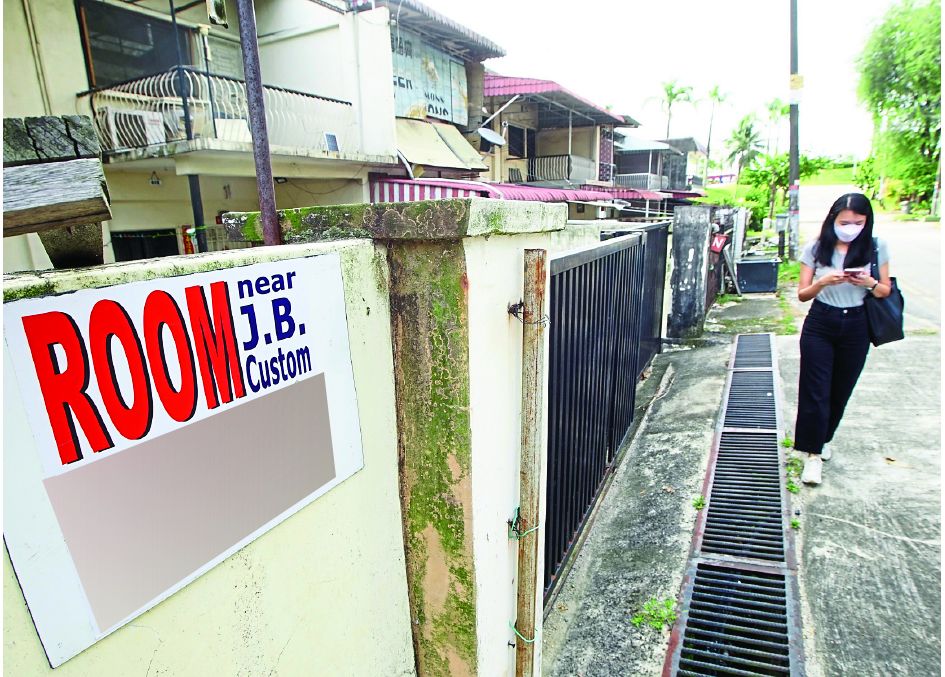Busy artery: Traffic congestion is a problem in Johor Baru but residents are hoping the Johor Baru-Singapore Rapid Transit System Link that is being built in the city centre will improve the public transport system. — THOMAS YONG/The Star
RESIDENTS of a fast-developing city like Johor Baru face various urban challenges ranging from insufficient public transport and damaged roads to the rising cost of rent and food.
Rising expenses
Mohd Firdaus Aman, 39, said his income as a technician was not enough to support his wife and two children.
“It is quite common for people like me to work two jobs these days. I have been a part-time ehailing driver for the past few years.
“With my third baby on the way, I have to put in more hours to save up for the extra expenses.
“However, it is tough as the competition is strong among ehailing drivers,” he told StarMetro when interviewed.
As an ehailing driver, he has experienced the shoddy road conditions in the city.
“Some roads, especially in housing estates, are poorly maintained with potholes popping up here and there. I have to be alert so I don’t hit one and damage my vehicle.
“Another concern is flash floods that occur frequently in some parts of the city when it rains heavily for hours,” Mohd Firdaus added.
Meanwhile, the rising cost of food worries R. Thivakaran, a 25-year-old who works as a security guard in Singapore.
He is annoyed that some eateries, especially those near the customs, immigration and quarantine (CIQ) building, are overcharging customers.
“I recently went to a mixed rice eatery near my rented room and was shocked when the bill came up to RM14. I had only chicken and rice.
“The waiter told me that I could afford to pay as I work in Singapore. Many who work in Singapore are staying in my area too as it is less than 2km from the causeway.
“I felt that the eatery was taking advantage of our hard-earned money by charging us unreasonable prices. I’ll never go back to that shop,” said Thivakaran.
He also has to deal with traffic congestion at the Causeway daily.
“Although the state and Federal governments are taking steps to alleviate congestion, I leave early just in case there are other delays like accidents or disruptions to the immigration clearance system,” he said.
The cost of rent in Johor Baru concerns biomedical technician Aina Yunus, 29, who said it was getting increasingly high, especially after the Malaysia-Singapore border reopened in April last year.
In 2021, when she moved into her three-bedroom apartment in Taman Suria Muafakat, she paid a monthly rent of RM1,100.
“At the time, it was easy to find affordable accommodation because of the border closure, which stopped many Malaysians working in Singapore from coming back to the city.
“So there were many available units to choose from.
“However, after the border reopened and the economy started to recover, my rent shot up to RM1,500 in July last year.”
Another issue Aina highlighted was the traffic congestion heading into the city centre near the CIQ building because of ongoing construction work on the Johor Baru-Singapore Rapid Transit System (RTS) Link.
“The project to build a station at Bukit Chagar has caused a bottleneck along that stretch, especially during peak hours and weekends, so I avoid going to the malls in that area.
“But I know the project will ultimately benefit Johoreans as it can help to improve the public transport system and maybe ease traffic at the causeway,” she said.
Unstable Internet connection
University student Seng Li Juen said the Internet connection in parts of Johor Baru was still weak.
The 23-year-old, who volunteers with a non-governmental organisation helping the Orang Asli in the city, said many schoolchildren were having a tough time keeping up with their schoolwork because of the unstable Internet connection.
“During the movement control order period when classes were moved online, some pupils staying in flats had to attend their virtual classes in the carpark area.
“My cousin, who stays in Taman Tampoi Indah, is still experiencing poor connection.
“He has no choice but to complete his homework at his mother’s sundry shop as he needs to access the Internet for research,” she said.
Public transport grouses
Yeap Chung Yeow, 60, hopes for a more efficient public bus service as he often has to wait up to an hour for his ride to the city centre where he works as a restaurant cook.
“I stay in the Pandan area, which is 12km from my workplace, but I will usually leave my house at least two hours before I start work in case there are further disruptions like the bus breaking down.
“It gets worse at night when there are fewer buses.
“I finish work at 9pm and if I miss the bus around that time, I will have to wait until 10pm for the next bus. Even then, it is not guaranteed that it will come. There were times when I waited until 11pm,” said Yeap.
He said the service was better years ago when there were more bus companies operating in Johor Baru.
“I believe that the irregular bus schedule is a chicken-and-egg situation because there are fewer people taking buses these days, leading to only a small number of bus companies in operation.
“However, it can be said that the inefficient bus service makes public transport unappealing to the masses,” he said.
Polytechnic student M. Dathshan, 20, echoed Yeap’s views on the frustrating public bus schedule.
“I study in Pasir Gudang and take the bus home to Skudai on weekends. I have to wait 30 to 60 minutes for the bus.
“I have to take public transport because it is cheaper than taking an ehailing ride which can cost me up to RM40. The bus fare is only RM3.40 each way.”
Dathshan, who is pursuing a diploma in electronic engineering (communication), said he was on a tight budget as he had to use his allowance for meals, hostel rent, assignment materials and transport.
He hopes more eateries will offer Menu Rahmah as it is difficult to find cheap meals for dinner near his polytechnic.
Under the Menu Rahmah initiative, participating eateries offer meals priced at only RM5 to help the less fortunate.
Another problem highlighted by StarMetro recently was the lack of proper parking lots in the busy Johor Baru city centre.









